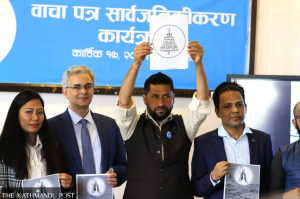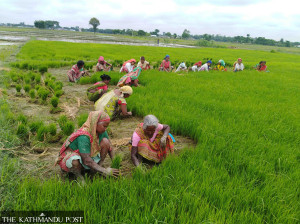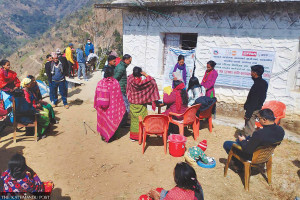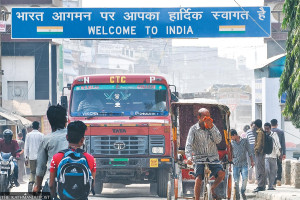 16.12°C Kathmandu
16.12°C KathmanduColumns
Disillusioned in Dubai
With big polluters just paying lip service at COP28, those from less polluting countries are greatly disappointed.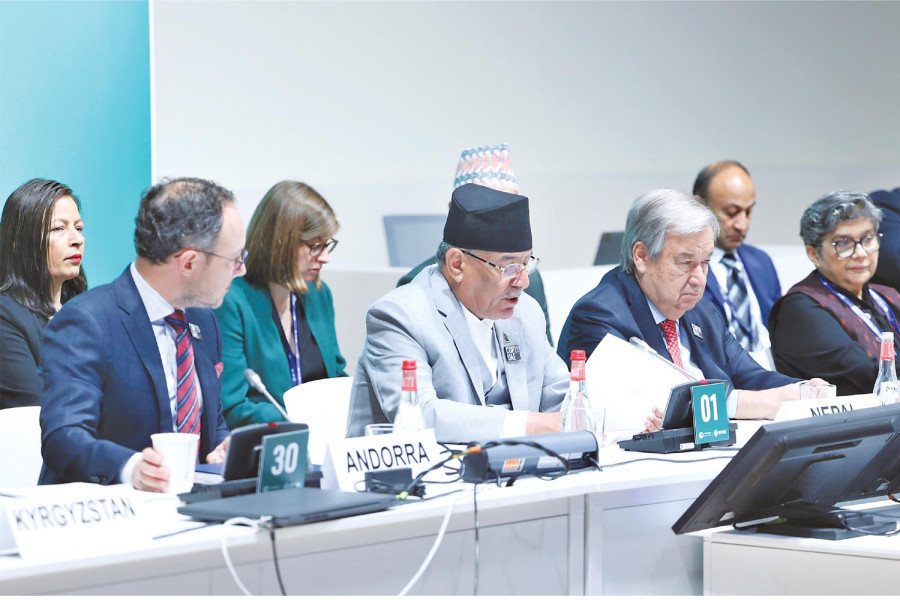
Achyut Wagle
The two-day jamboree of the World Climate Action Summit of the world leaders as part of the 28th annual meeting of the 'conference of parties' (COP28) under the 1992 United Nations Framework Convention on Climate Change (UNFCCC) came to a close on December 2 in Dubai. However, the 'negotiations' may continue at least till December 12 in multiple dimensions among reportedly 100,000 participants from 185 countries gathered in the emerging global town of the United Arab Emirates. COP28 is, in fact, a follow-up to COP26, which made countries agree to keep the global average temperature rise in this century as close as possible to 1.5 degrees Celsius above pre-industrial levels. It is said to be a binding agreement.
According to the United Nations, COP28 was expected to provide a reality check—a culmination of a process called 'Global Stocktake' for the countries and other stakeholders to see where they are in meeting the goals of the Paris Agreement and where they are not. Although leaders and delegations from several countries, including Nepal, used the climate summit as an occasion to embark on a foreign junket, presidents of the world's two largest polluting nations, the United States and the People's Republic of China, Joe Biden and Xi Jinping, respectively, chose to remain absent. Data suggests that China and the US contributed 53 percent and 18 percent of emissions of carbon dioxide gas during the last three decades. Their absence, therefore, is a damper to the entire effort.
No takers of foul cry
Foul cries and begging bowl diplomacy of the poor and vulnerable countries are often heard abundantly in such forums. Addressing the COP28 event, Nepal Prime Minister Pushpa Kamal Dahal tried to sound passionate. “Mountains are tortured by rising temperatures. Save them first,” he said. His concerns were echoed by the United Nations Secretary-General Antonio Guterres: “Nepal’s mountains are crying out for help, and COP28 must respond…I am calling for developed countries to clarify the delivery of the $100 billion and to produce a clear plan to double adaptation finance to $40 billion a year by 2025—as a first step to devoting half of climate finance to adaptation.” There were similar calls from poor, vulnerable and sinking small island nations.
Unfortunately, there are no serious takers of these concerns. The UN itself is increasingly becoming a toothless organisation unable to mend the global governance disorder not only in climate crisis but also in many other areas. During the Covid-19 pandemic, it could do little to ensure vaccine justice except staring at how the rich countries monopolised the supply until their populations were fully vaccinated before making them available to poorer courtiers. The UN's peace-making role is now a travesty at the height of the global arms race and supply chain disruptions exacerbated after the Russia-Ukraine war in particular. The global trade regime is at the mercy of the US-China trade war, and the debates over trade fairness have failed even to tangentially help improve the scope of trade competitiveness of small, developing and voiceless nations.
Coming back to climate, gatherings like COP have essentially become periodic rituals. They can neither change the over-exploitative and unsustainable behaviour of the powerful, developed nations and their citizens nor are they ready to judiciously compensate the least developed and developing countries. For instance, China's electricity mix is the following: Sixty-five percent from fossil fuel, 31 percent from renewables, and the rest from nuclear and other projects; for the US, a similar mix is 44, 41 and 15 percent, respectively. In India's case, fossil fuel accounts for 77 percent of the total electricity generation, while 20 percent comes from renewable sources and 3 percent from other sources.
The extent of direct use of fossil fuel as energy for transportation, industrial and household consumption is fairly comparable. China is the largest consumer of coal, the most pollutant source among the fossil fuels. Similarly, China, India, Japan, the US and Russia are the five largest producers (in that order) of iron and steel. This has multiple ramifications—from climate impact due to excavation and mining, nature of energy used in smelting furnaces, and their use in physical infrastructure development.
The disillusionment
There have been incremental but not really transformative efforts by the developed large economies in replacing the fossil fuel. Their citizens are unwilling to sacrifice their luxuries by reducing the per-family ownership of private vehicles, refrigerators or air conditioner, non-renewable waste, or by cutting down on air travel or economise the cargo shipment through sea routes.
Despite this, the richer countries are actually designing their strategies to prevaricate their commitment to behaviour change of their government and the citizens. And, the debate on climate sustainability is perhaps deliberately lopsided to focus it on only carbon emissions and temperature rise. The devastation of natural ecosystems by mining, deforestation and irrational consumption has failed to become the mainstream debate on climate change. Even when renewable energy and non-emitting battery-operated cars are presented as the panacea to the crisis, the extent of mining and smelting of steel, nickel, uranium and lithium are grossly overlooked.
This is largely because the agenda and the narrative of global debate on these murkier issues are set by the developed world, which is keen on protecting its vested interests. The so-called third world is just joining the bandwagon and stretching its arms for alms where even the promises to support are far dwarfer than both the damage and the demand. Actual disbursements have always been a tiny fraction of the commitments made.
The disillusionment of the underdeveloped world on summits like the COP emanates from the fact that their dreams of development are likely to be thwarted forever. Materials such as steel and cement for infrastructure and urban development are unlikely to be adequately supplied without using fossil fuel, where a large and consistent amount of energy supply is needed. These economies are unlikely to be adequately compensated for lesser greenhouse gas emissions. Worst of all, the vulnerable group of countries may raise some voices, but there are no means and guardians to enforce justice in their favour. COP28 is another episode in the disappointment and disillusionment of the poor and their hapless governments.











